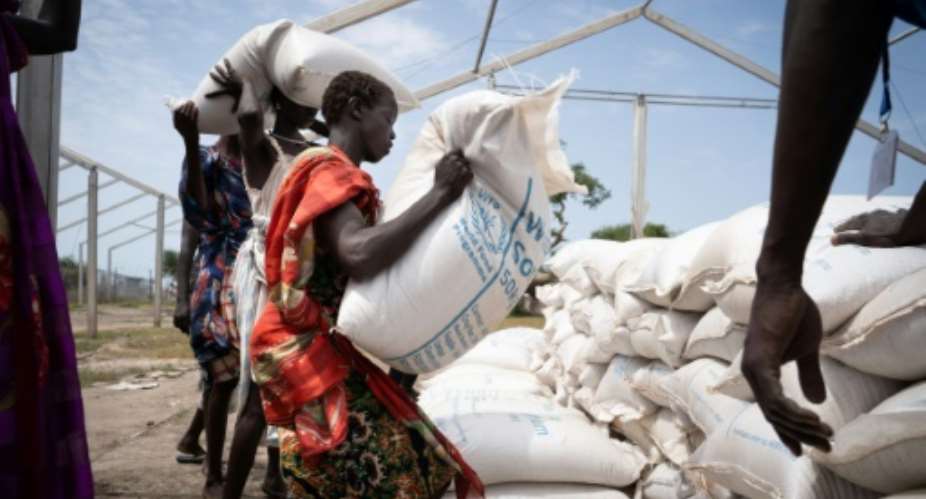A coalition of South Sudanese civil society groups has launched a public campaign to demand political change after 10 turbulent and often bloody years of independence, declaring: "We have had enough".
The world's newest nation has struggled to recover from a civil war unleashed only two years after its 2011 creation and is now grappling with chronic instability and a desperate hunger crisis.
The People's Coalition for Civil Action (PCCA) said it wanted South Sudanese living at home and abroad to mobilise and "make their voices heard", warning that if nothing changed, the country could be heading back to war.
"We invite all the citizens of South Sudan to come in their thousands to join the coalition," PCCA representative Rajab Mohandis said at a press briefing in the capital Juba on Thursday.
"We have had enough of war, enough of corruption, enough of insecurity, enough of economic hardships, enough of public neglect and leadership failure."
The current leadership of President Salva Kiir "has completely failed in its responsibility", Mohandis charged, warning that if South Sudanese do not act, the country is heading for another wasted 10 years.
 Map of South Sudan. By (AFP/File)
Map of South Sudan. By (AFP/File)
It is the first time in South Sudan's young history that such a call for public action has been made and by such a broad cross-section including academics, civil society, think tanks, lawyers, women's and youth groups as well as former senior government officials.
There has as yet been no response from the coalition government to a 12-page declaration issued by the PCCA Friday to coincide with the anniversary of the 2005 death of rebel leader John Garang.
But any public protests could see a tough response from the security forces.
'Intractable political crisis'
South Sudan formally split from its northern neighbour Sudan on July 9, 2011 to scenes of great jubilation.
But a decade on there is little to celebrate, with the economy in tatters, hundreds of thousands of people facing hunger, and escalating insecurity and communal violence.
Mohandis said the country is "descending deeper into intractable political crisis" and that a 2018 power-sharing deal between Kiir and his archfoe turned deputy Riek Machar to end the brutal civil war is "collapsing".
'We therefore have at hand a real possibility of the country sliding back to war," warned Mohandis, executive director of the Organisation for Responsive Governance.
South Sudan has struggled with lawlessness and inter-ethnic violence since the civil war that left nearly 400,000 people dead.
 South Sudanese President Salva Kiir (right) pictured in February 2020 with his one-time rival turned deputy Riek Machar. By ALEX MCBRIDE (AFP/File)
South Sudanese President Salva Kiir (right) pictured in February 2020 with his one-time rival turned deputy Riek Machar. By ALEX MCBRIDE (AFP/File)
Peace remains fragile despite the 2018 ceasefire, with many parts of the vast country of 12 million people ungoverned and violent, and the security forces underfunded and divided.
Earlier this week the United Nations demanded an end to extrajudicial killings after the grisly execution of at least 42 people, including boys, in the northwest and centre of the country.
Abraham Awolich, a PCCA representatives from national think-tank the Sudd Institute, said it was time the South Sudanese "take control of their country".
"In the last 10 years the people of South Sudan have been dormant, they have not been challenging the status quo in the Republic of South Sudan and we cannot expect to have a democratic country without active citizenship."





 Whoever participated in the plunder of the state must be held accountable – Jane...
Whoever participated in the plunder of the state must be held accountable – Jane...
 A vote for John and Jane is a vote to pull Ghana from the precipice of destructi...
A vote for John and Jane is a vote to pull Ghana from the precipice of destructi...
 I’ll repay your abiding confidence with loyalty, understanding and a devotion to...
I’ll repay your abiding confidence with loyalty, understanding and a devotion to...
 ‘I’ve learnt deeply useful lessons for the future' — Serwaa Amihere breaks silen...
‘I’ve learnt deeply useful lessons for the future' — Serwaa Amihere breaks silen...
 I’m sorry for the embarrassment – Serwaa Amihere apologises for leaked sex video
I’m sorry for the embarrassment – Serwaa Amihere apologises for leaked sex video
 Dumsor: Matthew Opoku Prempeh not in charge of Energy sector – Minority
Dumsor: Matthew Opoku Prempeh not in charge of Energy sector – Minority
 Adu Boahen’s murder: Police arrest house help who was in possession of deceased’...
Adu Boahen’s murder: Police arrest house help who was in possession of deceased’...
 Akufo-Addo nominates Felicia Attipoe as Tema West MCE
Akufo-Addo nominates Felicia Attipoe as Tema West MCE
 Election 2024: I can't have someone I defeated twice as my successor – Akufo-Add...
Election 2024: I can't have someone I defeated twice as my successor – Akufo-Add...
